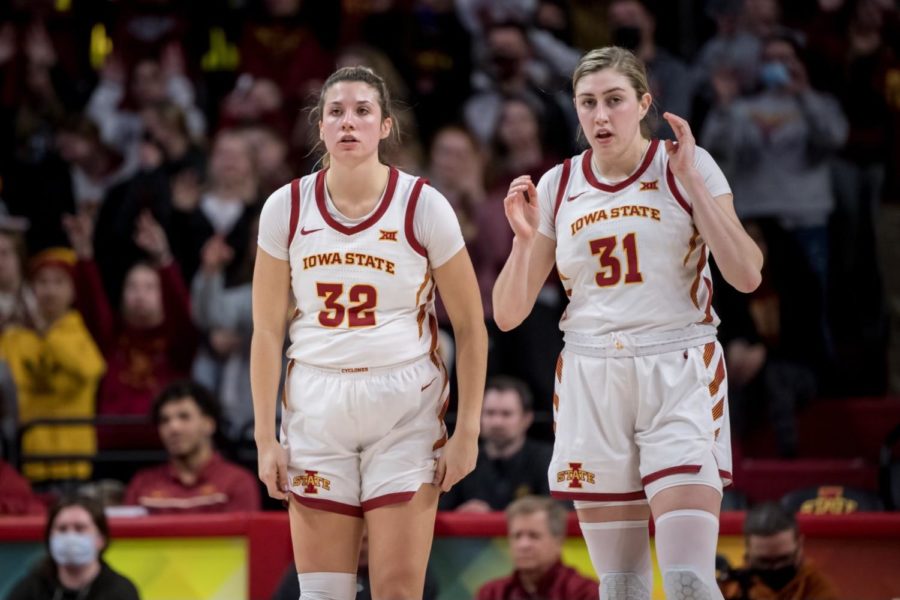Pressure on the court: Exploring mental health with women’s basketball
Maggie Vick and Morgan Kane on the court against the Texas Longhorns January 2022. Courtesy of Luke Lu of KL6PHOTO.
Maggie Vick’s alarm clock jolts her awake at 8 a.m., signaling the start of a new day. Between eating, sleeping, attending classes, lifting weights, practicing and completing homework, practically every minute of this day is planned out to a T.
As a matter of fact, for Vick, a forward on the Iowa State University women’s basketball team, nearly every day needs to be mapped out in some manner so she can utilize her time wisely. With athletic performance-based pressures placed on top of such tight schedules, it can be difficult for collegiate student-athletes to appropriately care for their mental health.
“We don’t really have an offseason,” said Vick, a sophomore studying political science. “We practice basketball pretty much 24/7.”
Despite only competing during a few months out of the year, the women’s basketball team is almost always in training. The team begins practicing when they arrive in Ames in August and continues until their season ends, according to Vick. When the season ends, they get a week off before starting up again in April and going all the way through the summer.
However, putting in 20 hours of practice per week while officially “in season” is just one element that contributes to the sometimes-challenging dynamic of being a student-athlete.
The NCAA conducted a survey on the mental health and well-being of 9,808 student-athletes from the Division I, II and III levels in fall 2021. As a report presenting these survey results stated, “In most instances, the rates of reported mental health concerns experienced within the last month [before the survey] were 1 ½ to two times higher than have been historically reported by NCAA student-athletes prior to 2020.”
“I think student-athletes face unique demands,” said Catelyn Fix, mental health clinician and coordinator for Iowa State Athletics. “You’ve got the impacts of traveling, you’ve got the impacts of training [and] you’ve got the impacts of doing your schoolwork. Having to figure out how to manage all of those things can be really tricky.”
These high demands can sometimes lead to a problem feared by many athletes: burnout.
This concern is becoming more widely acknowledged in the realm of athletics. Reaching a point of mental and emotional fatigue, often referred to as burnout, is something people are careful to avoid.
Morgan Kane, a senior majoring in kinesiology and health, is also a forward for the Cyclones. She has noticed that many of the challenges faced by student-athletes are universally experienced.
“No matter what sport you’re on, we all encounter very similar things, but in the moment, we all think it’s just happening to us,” Kane said. “There’s a huge push nowadays to really unite athletes [and show them], ‘You’re not alone.’”
Having a strong support system is an integral part of alleviating burnout because trying to shake it off without help can increase its effects.
“If you’re getting burned out, that’s normal,” Kane said. “Let’s find some strategies to work with it instead of just having athletes isolate themselves and dig a deeper hole.”
One difficulty experienced by all students, not just athletes, is making the initial transition to college. Among other things, they need to move, meet new people and become independent.
When first transitioning to life as a freshman at Iowa State, Vick, a native of Morristown, Tennessee, was so focused upon excelling both in the classroom and on the court that she lacked a social life. Since finding a group of friends outside her basketball team, Vick’s mental health has improved “tremendously.”
“I think [having a community] really helps to ground you and make sure you’re not putting your identity in your sport, because as an athlete, that’s really common,” Vick said. “We often define ourselves by how we’re performing. It helps put you in perspective and see it isn’t as big of a deal as you’re making.”
Many individuals struggle with understanding that their identity goes beyond just being an athlete. This can result in additional internal pressure being placed upon athletic results.
Mark Coberley, director of sports medicine and associate athletics director at Iowa State, has observed the effects of this mindset over the years. Coberley joined the ISU Sports Medicine Department in 1993 and is currently responsible for helping oversee different elements of student-athlete wellness.
“I think we’ve got to do a lot better job of letting student-athletes know that their identity is not that of an athlete,” Coberley said.
Often, this thought pattern pertaining to one’s athletic identity originates even before student-athletes take their first steps on campus. Hailing from West Jordan, Utah, Kane comes from a highly-competitive athletic background. She grew up playing in Amateur Athletic Union travel tournaments and knew at a fairly young age that her goal was to earn an athletic scholarship.
Kane began her time at Iowa State in fall 2018 and redshirted her freshman year. However, the initial transition to being a collegiate athlete came as a shock, causing her to feel overwhelmed at times.
“You go from being the best player in high school to being at the bottom of the totem pole, and coaches still demand high expectations from you,” Kane said. “I was really hard on myself, just wanting to be perfect in everything I did, wanting to live up to this name that I wanted to have at Iowa State and compete with the other players and kind of battling the mental side of, ‘Do I really belong here?’”
Following her true freshman year, Kane began playing in her first season of collegiate basketball. Between the high standards set by her coaches, teammates and herself, she needed to find an effective way to cope with these pressures.
Having heard about a resource from others in the student-athlete community, Kane made the decision to start seeing a sports therapist on campus.
“I wanted to use that resource because I know I needed some help mentally with my game,” Kane said. “My basketball game was suffering because I was so in my head, or so nervous to make a mistake or anxious about practice.”
A more recent factor impacting student-athlete well-being is social media.
“[Social media] truly is one of the issues why [the student-athlete experience] is different now even than five years ago and certainly 10 years ago,” Coberley said. “You didn’t have a student-athlete having people on Twitter absolutely berating them.”
In Vick’s experiences, she has noticed that her headspace is best when she stays off social media in the hours both preceding and following a game.
“Sometimes, [social media] can cause you to fall into the comparison trap,” Vick said. “Then I would say, with people talking about us…especially coming up with a loss against [the University of North Carolina at Chapel Hill], it was pretty brutal reading some of the Twitter comment sections.”
Despite the growing number of mental health resources available for student-athletes, there still appears to be a disconnect due to the stigma that surrounds receiving help. According to the previously mentioned NCAA survey, less than half of the student-athlete respondents said that they “would be comfortable personally seeking support from a mental health provider on campus.”
“Trying to use the resources available knowing that you can’t do it all on your own is a challenge,” Kane said.
Having been a collegiate basketball player herself, Fix understands some of the stresses that come with playing this sport at a high level. Although she is in her first year at Iowa State, Fix brings over six years of experience in working with collegiate student-athletes and is already making changes to the care the university provides.
“Mental Health Monday,” a type of prevention programming, is something Fix has begun to incorporate alongside the mental healthcare already offered within ISU Athletics. Once or twice each month, all athletes are welcome to join Fix and others to discuss mental health topics.
“For me, it goes back to not being afraid to start the conversation about mental health and the impact that has on our student-athletes because that’s what saves lives,” Fix said.
At the end of the day, Vick knows that if taking her dog for a walk or reading a book is not enough to calm her mind, she has the freedom to utilize any mental health resource she may need.
Your donation will support the student journalists of the Iowa State Daily. Your contribution will allow us to purchase equipment, send our student journalists to conferences and off-set their cost of living so they can continue to do best-in-the-nation work at the Iowa State Daily.











